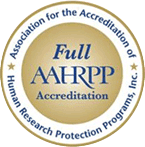Index
From the Director: University of Iowa Human Research Protection Program Achieves Reaccreditation!
HawkIRB Application Updates
IRB Educational Opportunities Now Available Over Zoom
Updated Data Security Guidance
Saying Goodbye: Researchers Leaving the UI
Resources for Potential Participants
IRB Advisor, March 2020
From the Director: University of Iowa Human Research Protection Program Achieves Reaccreditation!
By Michele Countryman
I am pleased to announce the University of Iowa Human Research Protections Program (HRPP) has achieved reaccreditation through the Association for the Accreditation of Human Research Protection Programs, Inc (AAHRPP) on March 15, 2020. The reaccreditation is good for the next five years. In 2003, the University of Iowa HRPP was the first academic institution to achieve accreditation. This year’s reaccreditation is the fourth reaccreditation for the UI program.
AAHRPP accreditation is an international industry standard reflecting a commitment to following the highest standards of ethics, quality, and protections of human subjects. The requirements of HRPP accreditation are based on nine principles, three domains, 16 standards, and 62 elements with a basis from the federal regulations for the protection of human subjects. At the University of Iowa, this deep commitment is only possible with support from institutional leadership, IRB membership, Human Subjects Office (HSO) staff, and the greater research community.
The reaccreditation process is a two-step, yearlong process. The first step is a review of the HRPP policies and standard operating procedures, and the second step is a two to three day site visit. This year our step one application was over 1000 pages long! The site visit included interviews with over 50 individuals from the Human Subjects Office, IRB members, HRPP members, and the research community. Thank you to everyone that participated in the interview process. Your contributions were an important part of the process!
The UI HRPP was recognized for the following strengths as part of the reaccreditation process:
- The Education and Outreach program offered extensive educational resources to inform and educate the research community about working effectively with the IRBs and conducting research with integrity. (Element I.1.E.)
- The Compliance Monitoring group provided a valuable service to the IRBs and the research community for helping to ensure regulatory compliance in the IRB review process and the conduct of human participants research. (Elements I.5.A. and I.5.B.)
- Human Subjects Office staff were recognized as being readily accessible and helpful. (Element I.5.C.)
- The HawkIRB system facilitated communication and transparency across the review process and helped to ensure regulatory compliance by incorporating numerous checks and balances within the system. (Standard I-2)
In particular, I would like to thank the HSO staff for all of their hard work in preparing for the AAHRPP reaccreditation. The success of the HRPP program is not possible without all of the hard work and dedication from each and every one of you. Thank you.
HawkIRB Application Updates
By Kelly O'Berry
The IRB and UI researchers have been using the eResearch (HawkIRB) system since 2005. Since HawkIRB is a homegrown system, we can make updates and improvements to assist the research community and other committees and entities that access the system to review a form. This month we are pleased to announce three new updates to the HawkIRB system.

If you have any questions or need additional information regarding these enhancements, please contact the Human Subjects Office at either irb@uiowa.edu or (319)335-6564.
Section II – Research Team
UI IRB policy allows students to serve as the Principal Investigator (PI) of their own project if they have the knowledge and credentials to do so. A student PI is required to have a Faculty Advisor who is named on the team and who agrees to oversee the conduct of the research. In Section II.3.a, when a student PI selects their Faculty Advisor, the HawkIRB system now checks whether the student named their Faculty Advisor as a HawkIRB delegate.
Only the PI and their HawkIRB delegates can access a draft New Project form in the HawkIRB system. Although it is possible for the student PI to share a printer friendly view of the draft form with their Faculty Advisor, the Human Subjects Office requests thatstudent PIs name their Faculty Advisor as a HawkIRB delegate to better allow the advisor to assist with the following:
- Preparation of forms - The Faculty Advisor should review all draft forms prior to submission to the IRB
- Addressing workflow items during the IRB review process – including use of the Edit function to modify attached documents
- Overseeing that the project is conducted as it was approved by the IRB
- Submitting all required forms after IRB approval (Modification, Continuing Review and Project Closure forms
If the student PI selects a Faculty Advisor who has not been named as their HawkIRB delegate, this warning pops up:
The selected Faculty Advisor does not have delegate access to this Project. Please add them on the User Delegates page.
The student PI can follow instructions in the Help Message (the blue circle with “i” near the question number) to add a delegate. This particular Help Message links to information on the Human Subjects Office website about adding a HawkIRB Delegate. If a student PI has multiple projects with different Faculty Advisors or HawkIRB delegates, they can follow the instructions on that same page for turning on the Delegate Permission System.
Comments on the Final Submission Page
When researchers submit a HawkIRB form, there is an open text field on the Final Submission Page to provide background or additional information about the submission that does not fit anywhere in the form itself.
The HawkIRB system now shows the comment from the Final Submission Page below the Workflow Correspondence. Here is how to find this in the HawkIRB system:
- Open the Project Summary Page
- Scroll down to the History section at the bottom
- Click on “Pending” or “Approved on [DATE]” in the Status column for the form
- Scroll down past the “History” of the review
- Below the “Correspondence” section look for the phrase “Submission Comment:”
If no comments were added at the time of submission, this section will be blank.
Determination Memos for Quality Assurance/Quality Improvement
Researchers who submit a Human Subjects Research Determination (HSRD) form for a Quality Assurance or Quality Improvement (QA/QI) project can now access the determination memo on the form approval tab like the regular HSRD form determination memo. To find the approval memo you must change the filter in the “Projects” section of the PI’s HawkIRB inbox.
Once an IRB Chair makes a determination about whether IRB approval is required, the HSRD form is closed. You can change the “Project Status” filter to “Closed” or “Any” to find the HSRD form after the determination is made. Click the IRB number to open the form and then click on the Approval tab to access the determination memo. These instructions are also in the automated email from the HawkIRB system when the determination is made.
IRB Educational Opportunities Now Available Over Zoom
By Maegan Tyrrell
Providing resources and educational opportunities to the University of Iowa research community is one of the Human Subjects Office’s top priorities. The ongoing pandemic has challenged us to think of new ways to support the UI research community. We made some changes in the way we offer HawkIRB Trainings, IRB Office Hours, class or small group presentations and New Faculty Orientations.
We are delighted to announce that we will now be offering HawkIRB Trainings and IRB Office Hours over Zoom starting in June. You will need to be signed in to Zoom with your HawkID. If necessary, select the option for single sign on (SSO).
- For HawkIRB Trainings, Pre-registration is required to obtain a Zoom link.
- IRB Office Hours will be held over Zoom every Wednesday, from 2-4 pm. The link to access office hours is on our website.
Additionally, the IRB Education and Outreach team is still available during the summer to give presentations via Skype or Zoom to classes, research teams or other groups. Email irb-outreach@uiowa.edu or call 319-335-6564 to set up a presentation.
The IRB will now hold New Faculty Orientations to the IRB over Zoom. If you or someone you know could benefit from one of these orientations, take the New Faculty/Staff Research Survey. An IRB Education & Outreach Specialist will reach out to you to schedule an orientation within one to two business days.
Updated Data Security Guidance
By Kelly O'Berry
The Human Subjects Office recently updated the Educational Tool about Data Security to provide additional guidance for conducting research virtually and remotely. During the COVID-19 pandemic, many researchers are exploring virtual data collection methods and data security methods while working remotely. This document now contains the expanded guidance provided during the COVID-19 ramp down and ramp up that includes:
- Making audio and video recordings
- Data security when conducting research virtually or outside UI space.
- Options for virtual and remote study activities, including eConsent
There are links to information and resources on the UI Information Technology Services (ITS) website. For further assistance, contact the ITS Research Technology Compliance Service at research-computing@uiowa.edu.
Check out all the Educational Tools posted on the Education & Training page of the Human Subjects Office website. There is also a page with guidance about COVID-19 research ramp up.
Saying Goodbye: Researchers Leaving the UI
By Kelly O'Berry
Summer is a time when many faculty, staff, trainee and student researchers leave the UI. When you move, there are always so many odds and ends to take care of and wrap up before you go. In this article we help you remember the things to do if you have any open HawkIRB application and/or if you want to take data with you to your new institution.
NOTE TO FACULTY ADVISORS OF STUDENT/TRAINEE PROJECTS: Please help them follow these instructions before they leave the UI.
Complete a PI Departure Checklist
There are two versions of the PI Departure Checklist posted on the Division of Sponsored Programs website, one for funded projects and the other for departmental or unfunded projects. These checklists get the ball rolling to help you transfer grants and other funding sources and take care of your open HawkIRB applications.
Submit a Project Close Form
If your research is complete, you should submit a very brief Project Closure form. It just asks the number of subjects enrolled or records reviewed and why you are closing the project.
Record Storage Requirements
According to IRB policy, and where applicable, you must leave the signed Informed Consent Documents on the UI campus for a certain period of time:
- 3 years – All projects that are not under the HIPAA regulations
- 6 years – All projects that have the HIPAA privacy section in the Informed Consent Document
- Indefinitely – All IRB-03 projects conducted at the VA Health Care System or using VA resources. Research related materials can be sent to the VA Research Office to ensure record retention requirements.
Submit a Modification Form
The IRB typically only oversees research conducted by UI researchers. If you will continue to be engaged in the research and you are going to an institution that has an IRB, you will need to obtain approval from that board or the UI IRB will need to establish an agreement with that board for us to continue to oversee your research activity.
If the project will continue here at the UI, you can submit a Modification form to change the Principal Investigator (PI) to someone who is still affiliated with the UI. Update all references to the PI throughout the application, including the Informed Consent Document and other documents. The new PI will need to sign a new Assurance Document.
You must have an active HawkID for you or your HawkIRB Delegates to be able to access the the HawkIRB application. It is very important to submit this Modification form far enough in advance to obtain IRB approval before your HawkID is deactivated.
Approval to Take Data With You
All data collected from UI research belongs to the University. The PI or a research team member needs permission from the institution to take data with you when they leave. If there is an open HawkIRB application, step one is to make sure this is described in your HawkIRB application and approved by the IRB. Step two is to work with the Division of Sponsored Programs to establish a Data Use Agreement or Materials Transfer Agreement. Completing the PI Departure Checklist will initiate this process.
Resources for Potential Participants
By Maegan Tyrrell
The Human Subjects Office has a webpage Info for the Public & Research Subjects that researchers can share with potential participants looking for more information about research involvement. Researchers can also use resources from this page during the consent process with participants.
Some of the resources include:
- Rights as a Research Subject
- Links to find current research studies in need of volunteers (Noon News, Clinical Research and Trials at UIHC, Clinical Trials.gov)
- Public outreach page from the Office for Human Research Protections (OHRP)
On the sidebar under “Info for the Public & Research Subjects,” there is a link to information about how to become an IRB member. In compliance with the federal regulations, the IRB has some members who are not affiliated with the institution, called “Community Members.” They play an important role in the IRB review of human subjects research.
Researchers and potential participants may find the OHRP public outreach page especially useful. This webpage provides a plethora of information about research participation. Participants can use this website to educate themselves before participating in research. Researchers can use this website to guide their discussion about the research study with potential participants; to make sure they make an informed decision about whether or not to participate.
Informational Videos
This page includes videos specifically for potential research subjects about clinical research and protecting human research volunteers. The clinical research basics section is a three-part series about volunteering in clinical trials that covers randomization in clinical trials and how medical research is different from medical care.
Questions to Ask
These questions are broken up by topic and there is an option to print all of the questions. The individual topics include questions for participants to ask about:
- The research
- What would happen (during the study and how participating might affect them)
- Risks involved
- Privacy and confidentiality
- Financial considerations
- Additional considerations
Protecting Research Volunteers
On this page the regulations are explained in lay terms. There are question headings for each subsection. For example, the first question listed is “Why Have Regulations to Protect Research Participants?” The link leads to a page with a brief timeline of events that led up to the creation of the regulations. All pages are short and include graphics to enhance understanding.
Additional Resources
This page provides a glossary of terms in English and Spanish. There are also links to federal resources such as ClinicalTrials.gov, Food and Drug Administration (FDA), and National Institutes of Health (NIH). There are a few videos about research from the New York Times and The New Yorker.
The Department of Health and Human Services (HHS) Assistant Secretary for Health, ADM Brett Giroir, MD., wrote about this page in his most recent blog post, “Empowering Research Participants with Information.” Dr. Giroir explains why resources like this are so valuable, not only for the public but also for the advancement of science and medicine overall.
OHRP periodically posts new videos or content. These resources are written in lay terms for the general public. All of these resources are available in English and Spanish and are free to use.
IRB Advisor, March 2020
By Maegan Tyrrell
IRB Advisor (a publication of Relias) is a monthly newsletter with articles about issues facing IRBs and individuals involved with human subjects research. Current and past issues of IRB Advisor are posted in the “IRB ICON Course for Researchers” which is accessible to anyone with an active UI HawkID. The portal to this ICON Course is on the Education and Training page of the Human Subjects Office website.
This month we are spotlighting articles from the March 2020 IRB Advisor Newsletter.
New Tech Research Raises Ethical Challenges for IRBs and Investigators
When 23andMe (a DNA genetic testing and analysis group) was only a small start-up company, they knew they were getting into uncharted territory by developing new technology that would involve human subjects. They wanted to abide by federal regulations for the protection of human subjects regardless of whether they had federal funding for the research. One of 23andMe’s goals was to follow the Common Rule (45 CFR 46) and to rely on an external, independent IRB for all human subjects research. The rest of the article further explains the collaborations between the company and the commercial IRB, Ethical & Independent Review Services.
Consent Library is Consistent With Quick Access to Better Wording
Memorial Sloan Kettering Cancer Center (MSKCC) created a consent library as part of a performance improvement project. A team at the center took language from IRB-approved consents and created a digital library of language for researchers to use in their consent documents. Originally, the library only included descriptions of risks a potential subject might experience. Later, the team also added words and terms describing procedures in simple terms. This library is available on a shared drive for MSKCC investigators and study teams. They plan to provide education to MSKCC researchers about how to use this library of terms and descriptions.
Other articles in this issue include:
- IRBs Can Work on Ground Floor With Start-Up Technology Firms
- IRB Devises Efficient, Time-Saving Annual Review Process
- Consent Calendar for Continuing Reviews Can Save IRB Meeting Time
- Protocol Activation Model Leads to Reduction in Time-to-IRB Approval





